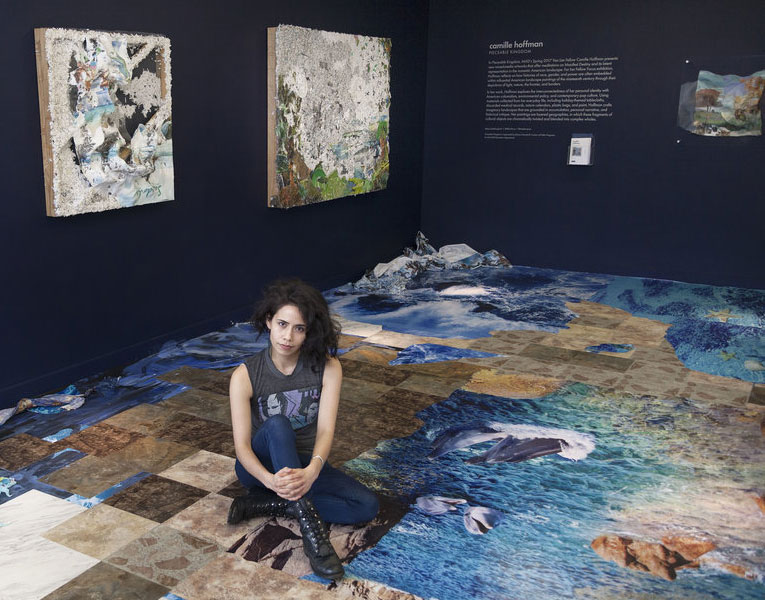The Art of Camille Hoffman
Sunset for Fred Church, 2016, acrylic, oil, plastic tablecloths, nature calendars, Top Ramen packaging, tiki party favors, plastic bag, and photos on board, 36 x 60 x 2 inches
My questions around the meaning of home and land, like my paintings, are tumultuous, layered, and liquiform. My collaged surfaces are a working corporal excavation into my past, a critical observance of the history of the earth that I live on, and the unrelenting violence on the multiple lands from which my ancestors come.
Moonrise After Adams, 2016, oil, acrylic, interior design magazines, nature calendars, Pioneer Supermarket bags, plastic tablecloth, linoleum, and gift wrap on wood, 48 x 48 x 3.5 inches
During the past four years and over the course of my many moves around the United States, I’ve found myself scouring neighborhood dollar stores in search of affordable fragments of home. The nostalgia of printed plastics that permeated the landscape of my Pilipinx-Jewish-American childhood continues to pervade the needs of my daily living, while my identification with these materials is inextricably linked to my memories of my intercultural, working-class household. Using mass-produced holiday-themed tablecloths, nature calendars, plastic bags, personal documents, and paint, I craft imaginary landscapes that are grounded in accumulation, personal narrative, and historical critique.
Leagues, 2016, oil, acrylic, plastic bags, plastic tablecloths, photos, nature calendars on wood panel, 48 x 96 x 3 inches
Concentrating on the subjects of home, nature, and borderlands, I see my domestic material experience as one that encompasses larger critical questions and deadly implications surrounding homeland, disposability, and diaspora here in the United States as well as on the ground in Palestine: What is a homeland and how is it constructed or deconstructed over time? What material memory does home and blood, like land and water, hold? Whose bodies belong and whose blood does the soil contain?
Tiers, 2015, oil, notebook paper, golf course calendars, skin whitening soap boxes, photos, and plastic on board, 48 x 60 x 2 inches
The Brightest I've Ever Seen Them, 2016, oil, acrylic, nature calendars, plastic tablecloth, carving on wood panel, 30 x 20 x 2 inches
Photo credit: Adrián S. Bará
Camille Hoffman (b. 1987, Chicago, IL) earned an MFA from Yale University (2015), a BFA from California College of the Arts (2009), and was a recipient of the Carol Schlosberg Memorial Prize for excellence in painting from Yale University, a National Endowment for the Arts scholarship, a Benjamin A. Gilman International Scholarship for research in Spain, and the Van Lier Fellowship from the Museum of Arts and Design (MAD). She has exhibited her work throughout the United States and in Europe, and has been featured in publications including Art in America and The New Yorker. Solo exhibitions include Excelsior: Ever Upward, Ever Afloat at the Queens Museum (2019), Pieceable Kingdom at the Museum of Arts and Design, New York, NY (2018), and Rockabye My Bedrock Bones at False Flag Projects, Long Island City, NY (2018). Prominent group exhibitions and venues include Here We Land at Wave Hill (2019), A Thousand Plateaus at Jenkins Johnson Gallery, LifeWtr Open Gallery at Lincoln Center and Times Square, New York, NY (2017), Music and Conversation at Yale University Art Gallery, New Haven, CT (2015), Nuit Blanche Arts Festival, Paris, France (2015), and Espai Cultural Biblioteca Azorín, Valencia, Spain (2008). Hoffman has been an artist-in-residence in programs including Lower Manhattan Cultural Council SU-CASA (2019), Children's Museum of Manhattan, New York, NY (2018), Wave Hill Winter Workspace, Bronx, NY (2018), QueenSpace, Long Island City, NY (2016-17), Museum of Arts and Design, New York, NY (2017), and the Yale University Office of New Haven and State Affairs, New Haven, CT (2015). Hoffman has also worked for over a decade as an arts educator and community organizer in Phoenix, the San Francisco Bay Area, New Haven, Brooklyn, and Queens. She currently lives and works in New York, NY, and teaches at Cooper Union and Bennington College.
Camille's art framed the stage of "Roses in Salted Soil," the May 3rd poetry event in Harlem, NY organized as an act of solidarity with Dareen Tatour on the day an Israeli court pronounced her guilty of inciting terrorism for a poem urging her people to resist oppression.
For more information about Camille Hoffman's art, visit her Website.


